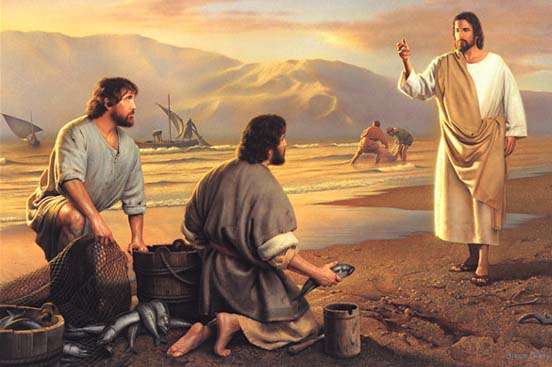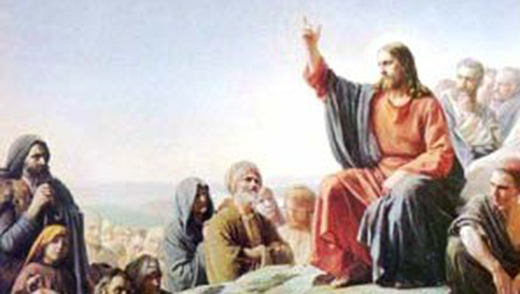In Jesus’ day, ordinary people were mighty poor by today’s standards. But Jesus chose to become part of an ordinary family, who struggled to have the basic necessities of life. This ordinary middle class, even though it made up the majority of the population, was largely ignored by the religious elite.
Isaiah predicted this humble upbringing for Jesus. In Isaiah 53, he said, “…He had no beauty or majesty to attract us to him, He was despised and rejected by men, a man of sorrows, and familiar with suffering.” v. 2-3 NIV
In order to understand Jesus’ method of discipleship, we must take a look at how He drew the masses to Him. For, it was the “ordinary” people—the fishermen, farmers, carpenters, shepherds, soldiers, and servants—who were most attracted to Him.
Memory Text: “Now as he walked by the sea of Galilee, he saw Simon and Andrew his brother casting a net into the sea: for they were fishers. And Jesus said unto them, Come ye after me, and I will make you to become fishers of men. And straightway they forsook their nets, and followed him” Mark 1:16-18 KJV
 This verse used to puzzle me. Did this mean that they indeed “forsook” or “left” their livelihoods altogether to follow Jesus? Later we do see the disciples on short fishing expeditions. Evidently they didn’t give up fishing entirely. They merely made Jesus their priority, and followed Him first. The “job” was never their whole reason for living. They had other “fish” to catch.
This verse used to puzzle me. Did this mean that they indeed “forsook” or “left” their livelihoods altogether to follow Jesus? Later we do see the disciples on short fishing expeditions. Evidently they didn’t give up fishing entirely. They merely made Jesus their priority, and followed Him first. The “job” was never their whole reason for living. They had other “fish” to catch.
Sunday: Humble Beginnings
From His modest birth in a stable to His youth being spent in the small, impoverished town of Nazareth, Jesus exemplified the life of an ordinary Jew. His parents were so poor that they couldn’t even afford the lamb for Mary’s purification offering after His birth. The poor were allowed to offer turtledoves or pigeons. (See Luke 2:21-28 and Leviticus 12:8.)
Discussion Questions: Wouldn’t Jesus have been able to accomplish more in His lifetime had He been born to wealthier parents?
Why do you think Jesus was given the parents He had?
Monday: Transforming the “Common”
Have you ever found yourself a bit bewildered, maybe even embarrassed, that Jesus chose as His first public miracle the changing of water to wine at a wedding feast? Of all the stupendous acts He could have used to impress His followers, this low-key event was the way He launched His public ministry.
Perhaps some of the reasons might involve:
- Marriage was a symbol of God’s relationship with us.
- Water, a common substance, became the sweetest wine, illustrating how Jesus came to change us from something common to something sweet and valuable.
- This was the first of many social situations Jesus used to reach people where they were.
- It verified that Jesus was interested in ordinary people, not just the wealthy elite or even the extremely downtrodden outcasts.
Discussion Questions: Besides the disciples, think of as many Bible characters as you can who came from humble beginnings. [David (a shepherd boy), Esther (a war orphan), Moses (born a slave)–Even those characters who had some wealth and education to start out with, such as Abraham, Joseph, Solomon, Daniel, and Paul, had lean years when they suffered poverty and want in one form or another.]
Why is so much of the Bible about ordinary people living extraordinary lives in the Lord?
It’s so easy to become enthralled with those who stand out in our society today—the TV and sports icons and the fabulously rich. How do we keep from valuing worldly views of success and wealth though and why is it important to do so?
Tuesday: A Flawed Fisherman’s Calling
It’s hard to deny the wide reach of Peter’s influence. The New Testament gives us ample evidence of his powerful role in the development of the Christian church. Of all the disciples who knew the Lord personally, he stands out as one of the most influential.
Three passages help us understand how this rough fisherman changed so radically and “caught” so many men, as Jesus predicted.
1. Peter was humbled in Jesus’ presence. Luke 5:1-11 relates how their fishing nets were filled to overflowing after they followed the Master’s directions and cast their nets in a place where there had been no fish. Peter falls down before Jesus and announces, “Depart from me, for I am a sinful man, O Lord!” v. 8 NKJV
2. He was bold in recognizing Jesus for who He was. Matthew 16:13-17 tells of the time when Jesus asked His disciples who they thought He was. Peter was quick to answer, “You are the Christ, the Son of the living God.” v. 16 NKJV
3. He felt appropriate sorrow for his mistakes. Matthew 26:75 reveals that Peter wept bitterly when he realized he had denied the Lord, after it had been prophesied by Jesus that he would do so three times before the cock crowed.
Through Jesus’ patient instruction Peter became a changed man, someone who helped change the course of history.
Discussion Questions: Why is it so easy to make judgments about a person’s character and dismiss them as one not worthy of discipleship?
This would include self judgments. Do we find it hard to imagine the role we ourselves could play in becoming “fishers of men”? How do we overcome that barrier?
Wednesday: Heavenly Evaluation
Heaven does not have a class system. The things we esteem here on earth as status symbols will have no bearing on our position in God’s heavenly kingdom.
To God, we are all equally important. All His creation is valued in God’s eyes. Sparrows, for instance, were the cheapest birds one could buy in the Jewish economy. Yet Jesus said:
“Are not five sparrows sold for two copper coins? And not one of them is forgotten before God. But the very hairs of your head are all numbered. Do not fear therefore; you are of more value than many sparrows.” Luke 12:7 NKJV
Discussion Questions: How did Jesus reach out to ordinary people? [His simple illustrations and parables, by placing Himself in their homes and social gatherings]
How can we avoid giving the impression that we regard some people more highly than others?
How can adult disciples be trained, if they haven’t had the kind of upbringing that fosters acceptance of all classes of people?
Thursday: A Classless Society
Four New Testament Bible writers testify that God’s kingdom of grace is a society without class distinctions.
- Paul in Galatians 3:28, 29—“There is neither Jew nor Greek, there is neither slave nor free, there is neither male nor female; for you are all one in Christ Jesus.” NKJV
- James in James 2:1 and 9—“My brethren, do not hold the faith of our Lord Jesus Christ, the Lord of glory, with partiality…But if you show partiality, you commit sin…” NKJV
- Peter in I Peter :17—“…call on the Father, who without partiality…” NKJV
- John in I John 3:16 and 18—“By this we know love, because He laid down His life for us [ALL of us]…My little children, let us not love in word or in tongue, but in deed and in truth.” NKJV
The early Christians tried hard to make their fellowship with each other meet these standards of impartiality. Acts 2:43-47 and 4:32-37 describe how they held all their possessions in common, how the rich among them even sold their riches to take care of those less fortunate.
What a shame that, as the church grew, these practices guiding the primitive church did not survive. True equality awaits us in heaven, however. There we will all throw our crowns at the feet of Jesus, and greed, hatred, and jealousy will be no more.
Discussion Questions: How do modern disciples demonstrate impartial love, without deference to one’s status or social standing?
Are there any church programs or ministries that incorporate this concept of love or that could do so better?
Summary: “In this closing work of the gospel there is a vast field to be occupied; and, more than ever before, the work is to enlist helpers from the common people. Both the youth and those older in years will be called from the field, from the vineyard, and from the workshop, and sent forth by the Master to give His message.” Ellen G. White, Education, pp. 269, 270. [Many mission programs today have taken this advice to heart: Maranatha, Adventist Services and Industries (ASI), Adventist Frontier Missions, and many others.]
Challenge: There are many disciples serving our churches faithfully who deserve recognition and appreciation. See how your church can honor some of these unsung disciples who work “behind the scenes” to make our worship service comfortable and effective. They include:
- Anyone working in the children’s Sabbath School divisions (including pianists and room decorators)
- Those who bring more than their share to fellowship dinners (and clean up afterward)
- The ones who turn on the furnace and cooling systems (sometimes at odd times of the day or night)
- Our lawn mowers, snow removers, and other handymen
- Even those who take out the trash!
Think of some way you or your Sabbath School class or church can honor them with a dinner, a thank you card (maybe with flowers), a gift card paid for from a special collection, or whatever means you have available.
Next week: Jesus and the Social Outcasts










